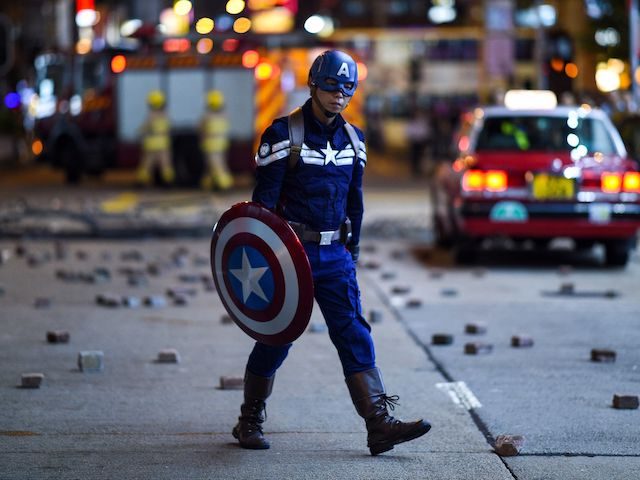A Hong Kong District Court sentenced a man who dressed up as the comic book character “Captain America” to protest China’s encroachment on the city’s limited freedoms last year to nearly six years in prison on Thursday for violating Hong Kong’s national security law.
Hong Kong District Court judge Stanley Chan sentenced Ma Chun-man, 31, to five years and nine months in prison on November 11, Radio Television Hong Kong (RTHK) reported. The sentencing came after Chan convicted Ma of “inciting secession by chanting pro-independence slogans” on October 25.
Chan ruled that Ma “advocated Hong Kong independence on 20 occasions, chanting slogans such as ‘Liberate Hong Kong, Revolution of Our Times’ and ‘Hong Kong independence, the only way out,’ and making pro-independence speeches” between August and November 2020. State prosecutors said Ma also promoted his secessionist ideas online through social media accounts.
Ma told the district court he had “merely exercised his freedom of speech” through the slogans, as guaranteed under Hong Kong’s Basic Law or de facto constitution. Chan responded to the defendant’s argument by saying Ma “had disregarded a major principle of the Basic Law: that Hong Kong is an inalienable part of China.”

Police special tactical squad detain a protester (C) in Wanchai, Hong Kong, on May 24, 2020, as thousands of demonstrators took to the streets to protest against a national security law. (Yan Zhao/AFP via Getty Images)
“[E]ven though few people responded to Ma’s chants, this didn’t mean there was no incitement,” the district court judge added, according to RTHK.
“The defendant’s various actions and speeches over a period of time … indicated clearly that he had every intention to incite others to follow his ideas and to push for the independence of Hong Kong,” Chan wrote in his ruling.
“The intention of the person incited is irrelevant. Nor is the prosecution required to prove that the incitee indeed carried out the offense incited,” he clarified.
Hong Kong residents traditionally enjoyed limited civil liberties under the city’s Basic Law, which came into effect in July 1997 after Great Britain returned Hong Kong, a former British colony, to Chinese rule. The Basic Law established a “One Country, Two Systems” policy that acknowledged Hong Kong as a part of China but allowed the city to retain its own legal system and select freedoms.
China’s ruling Communist Party began to impinge on Hong Kong’s independent judiciary in February 2019 when it proposed legislation that would have allowed the Hong Kong government to “consider requests from any country for extradition of criminal suspects, even countries with which it doesn’t have an extradition treaty and including mainland China, Taiwan, and Macau,” the BBC reported.
Thousands of people in Hong Kong took to the streets in March 2019 to protest the extradition bill. By April 2019, the government of Hong Kong Chief Executive Carrie Lam introduced “amendments to Hong Kong’s extradition laws that would allow criminal suspects to be sent to mainland China for trial,” Reuters reported.

A protester is detained by riot police during an anti-government rally in Kowloon Bay district on August 24, 2019, in Hong Kong, China. (Anthony Kwan/Getty Images)
The action spurred tens of thousands of people to demonstrate at Hong Kong’s parliament on April 28, 2019, to urge the city’s government to scrap the legislation. Protests against Hong Kong’s extradition bill mushroomed over the next few months to include millions of participants at times. The intense backlash against the bill eventually forced Lam to indefinitely delay the proposed extradition law on June 14, 2019.
Pro-democracy demonstrations continued in Hong Kong through the summer of 2020 despite the bill’s scrapping a year prior. In an effort to quell the tenacious protest movement, the Chinese Communist Party’s rubber-stamp legislature passed a national security law for Hong Kong and imposed it on the city on June 30, 2020. The law created four new crimes: terrorism, subversion, secession, and collusion with foreign forces.
“For the four offences, ‘serious’ cases will generally attract penalties of at least 10 years and up to life imprisonment. Regular cases will attract penalties of a minimum of three years behind bars and a maximum of 10 years,” the Hong Kong Free Press reported.

COMMENTS
Please let us know if you're having issues with commenting.